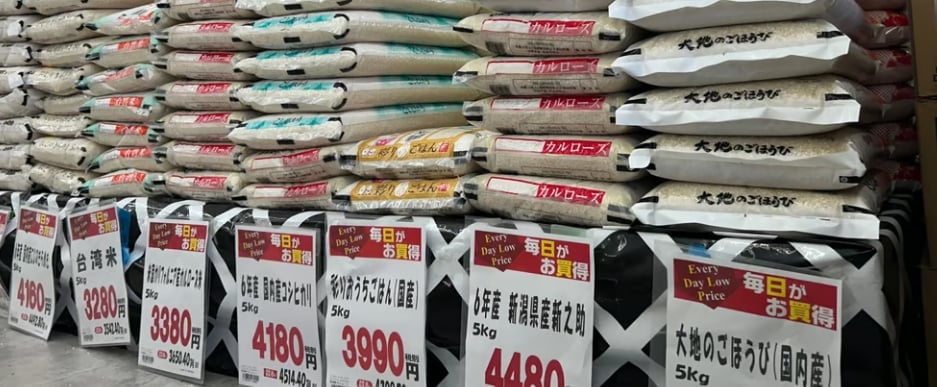November 19, 2025 | 09:24 GMT +7
November 19, 2025 | 09:24 GMT +7
Hotline: 0913.378.918
November 19, 2025 | 09:24 GMT +7
Hotline: 0913.378.918

Rice for sale in a Japanese supermarket. It costs nearly three times as much as rice in South Korea, with the price in March 2025 up over 90 per cent from a year earlier. Photo: Shutterstock.
An increasing number of Japanese tourists are visiting South Korea to buy rice, as prices continue to soar in Japan, retail industry officials say.
Japanese visitors have increasingly been spotted filling their carts with rice at supermarkets in Seoul in recent weeks.
This growing trend was highlighted in a viral post on X, formerly Twitter, where a Japanese tourist shared her experience of buying rice during a trip to Korea and bringing it back home.
The Japanese tourist, who identified herself as a middle-aged housewife, shared earlier this month that she bought 4 kilograms (8.8lbs) of white rice and 5 kilograms of brown rice in Korea during a layover in Seoul, after travelling from Cebu, the Philippines.
“My mission in Seoul was to buy rice, as prices in Japan have become too high. I decided to take the opportunity to purchase some while in Korea,” she wrote.
She said 10 kilograms of rice in Japan now costs around 8,000 yen (US$57), whereas the same amount can be found in Korea for barely a third of the price – the equivalent of about 3,000 yen.
As rice is classified as a regulated agricultural product, she had to undergo a quarantine process at Incheon International Airport to bring the rice back to Japan.
After completing the necessary documentation, she received a plant export certificate after officials verified her Japanese address.
The entire procedure took about 30 minutes. While the paperwork was relatively simple, she remarked that physically carrying the rice was the hardest part. “It felt like muscle training,” she wrote.
She also noted that more Japanese consumers are beginning to explore options for buying rice abroad, as domestic prices continue to surge.
According to quarantine officials at Incheon airport, the number of quarantine certificates issued for rice exports to Japan has surged in recent weeks.
In March alone, 119 certificates were issued – a twentyfold increase compared to the same period last year. This trend comes amid a prolonged surge in rice prices in Japan, which began last summer.
The price spike has led to frequent shortages, particularly in urban areas. The diminished supply of rice from the 2023 harvest, caused by extreme heat, coupled with rising demand from inbound tourists and panic buying triggered by recent earthquakes, has worsened the shortage.
According to Kyodo News, rice prices in Japan surged by 92.1 per cent in March, compared to the same month last year, marking the largest increase since 1971, when comparable statistics were first available.
In an attempt to curb the surge, the Japanese government has released rice from its reserves twice, but to no avail. In response, Korea is pushing to export 22 tons of rice to Japan, the largest shipment since 1990.
KRT

(VAN) More than 100 shoppers queued for a chance to get a kilo or so of Japanese rice for 500 yen ($3.32) by heaping as much grain into a small wooden box as possible.

(VAN) Benchmark international prices of milled declined in October as harvests started or improved in some parts of the globe.

(VAN) Show cause orders will be issued to retailers who sell imported rice at prices exceeding the maximum suggested retail price (MSRP) of P43 per kilo, Philippines Agriculture Secretary said in a statement on Thursday.

(VAN) Coffee prices on October 20, 2025, remained stable domestically, trading at 113,500–114,500 VND/kg. Similarly, global coffee prices also moved sideways.

(VAN) By October, Vietnam’s coffee exports had surpassed USD 7 billion for the first time and will exceed USD 8 billion within this year.

(VAN) Illinois rancher says Texas, Oklahoma, Kansas lost grass and forage, forcing massive cattle liquidation.

(VAN) Coffee prices on October 12, 2025, remained flat, trading at VND 113,000–VND 114,000/kg. This week, coffee prices continued to decline sharply.